Patient portrayal

Learn how to take your CABOMETYX for liver cancer*
*hepatocellular carcinoma (HCC) after treatment with sorafenib
Taking CABOMETYX
CABOMETYX is a non-chemotherapy tablet you can take at home once daily, or as directed
DO:
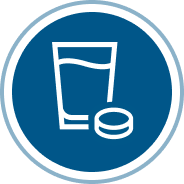
- Swallow your CABOMETYX tablets whole
- Take your CABOMETYX dose at the same time every day, or as prescribed
- Take CABOMETYX on an empty stomach; take CABOMETYX at least 1 hour before or at least 2 hours after eating
DO NOT:
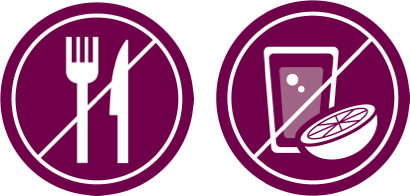
- Take CABOMETYX with food
- Crush, chew, or split the tablet
- Drink grapefruit juice, eat grapefruit, or take supplements that contain grapefruit or St. John's wort during treatment with CABOMETYX
If you missed a dose
If your next dose is in:
LESS THAN 12 HOURS

- Do not make up the missed dose
- Take the next dose when you usually take it
12 HOURS OR MORE

- Talk to your doctor or nurse if you miss a dose
Tips to help you remember to take CABOMETYX
It is important to take your medicine as directed by your doctor. Here are some tips you may find helpful.

Keep a calendar in an easy-to-see place and mark it each time you take your medicine

Use a weekly pillbox

Set an alarm on your clock, computer, or phone, and take your medicine when the alarm alerts you

Take your CABOMETYX right before or after a daily routine like brushing your teeth or feeding your pet

Keep your CABOMETYX in an easy-to-see spot so it acts as a visual reminder
(Remember to keep your medicine out of reach of children)

Ask a family member or friend to call or stop by to help remind you

Talk with your doctor, nurse, or pharmacist. They may be able to offer suggestions to help
Hear Advice on How to Remember to Take Your Medicine
Hear from actual patients, Deanna and Rosa, about how they stay on track taking CABOMETYX.
Recommended starting dosage
Your doctor and nurse will determine the right starting dose for you.
Each person who takes CABOMETYX will respond differently.
THIS IS THE USUAL RECOMMENDED STARTING DOSAGE FOR CABOMETYX

CABOMETYX 60 mg once daily
Hear Why Your Dose May Change
Dose modifications are common during treatment, explain Marc Matrana, M.D., and Erin Pierce, N.P. Learn why and how they may happen.
Managing certain side effects
What can you do to help manage certain side effects?
Your healthcare team has options to help manage certain side effects.
Not everyone will stay on the same dose of CABOMETYX. Finding the right dose for you may help keep you on treatment.
YOUR HEALTHCARE TEAM WILL PARTNER WITH YOU TO FIND A BALANCE BETWEEN EFFICACY AND MANAGING SIDE EFFECTS

Your dose may be adjusted based on how your body responds to the medicine

Dose adjustments are not setbacks, since they may help you stay on treatment

Dose reductions are a way to customize treatment according to your needs
Your doctor or nurse may also recommend lifestyle changes and other medicines to help with certain side effects.
Please note that not all side effects can be managed, and some may lead to permanent discontinuation of the medicine.
Your healthcare team is your best resource
Your doctor, nurse, or member of your healthcare team can help you manage certain side effects. How you feel is important to them and they want to offer additional support if you need it.
No concern is too small to bring to their attention. They are available to help you.
If you have any concerns or are not feeling well, reach out to them right away.
See How Open Communication Can Help
Open communication with your healthcare team is important, explain Deanna and Rosa. These actual patients discuss why people should talk about how they’re feeling throughout treatment with CABOMETYX.
These videos feature real patients and healthcare providers to show their individual treatment experiences with CABOMETYX. Some participants were paid for their time and expenses in sharing their story. Individual results may vary. The information in this video is not intended as medical advice. Your healthcare team is your best resource for information about your treatment. If you have any questions about your condition or treatment, contact your healthcare team.
We have an approach called AIM to help you share information with your healthcare team.

ACKNOWLEDGE
if you are feeling different; this may be a symptom or a side effect

INFORM
your healthcare team right away

MANAGE
side effects by working with your healthcare team
The sooner you share information, the sooner your healthcare team can help you manage certain side effects.
Your healthcare provider may change your dose, temporarily stop, or permanently stop treatment with CABOMETYX if you have certain side effects. Please note that not all side effects can be managed, and some may lead to permanent discontinuation of the medicine.
Understanding side effects CABOMETYX may cause
Taking CABOMETYX may cause side effects, including serious side effects. You can read more about the side effects associated with CABOMETYX here.
Side effects can happen at any time, including within the first few weeks of starting treatment with CABOMETYX.
Below are select side effects associated with CABOMETYX
Tell your healthcare team right away if you have a side effect that bothers you or does not go away. Below are some select side effects that may occur while taking CABOMETYX:
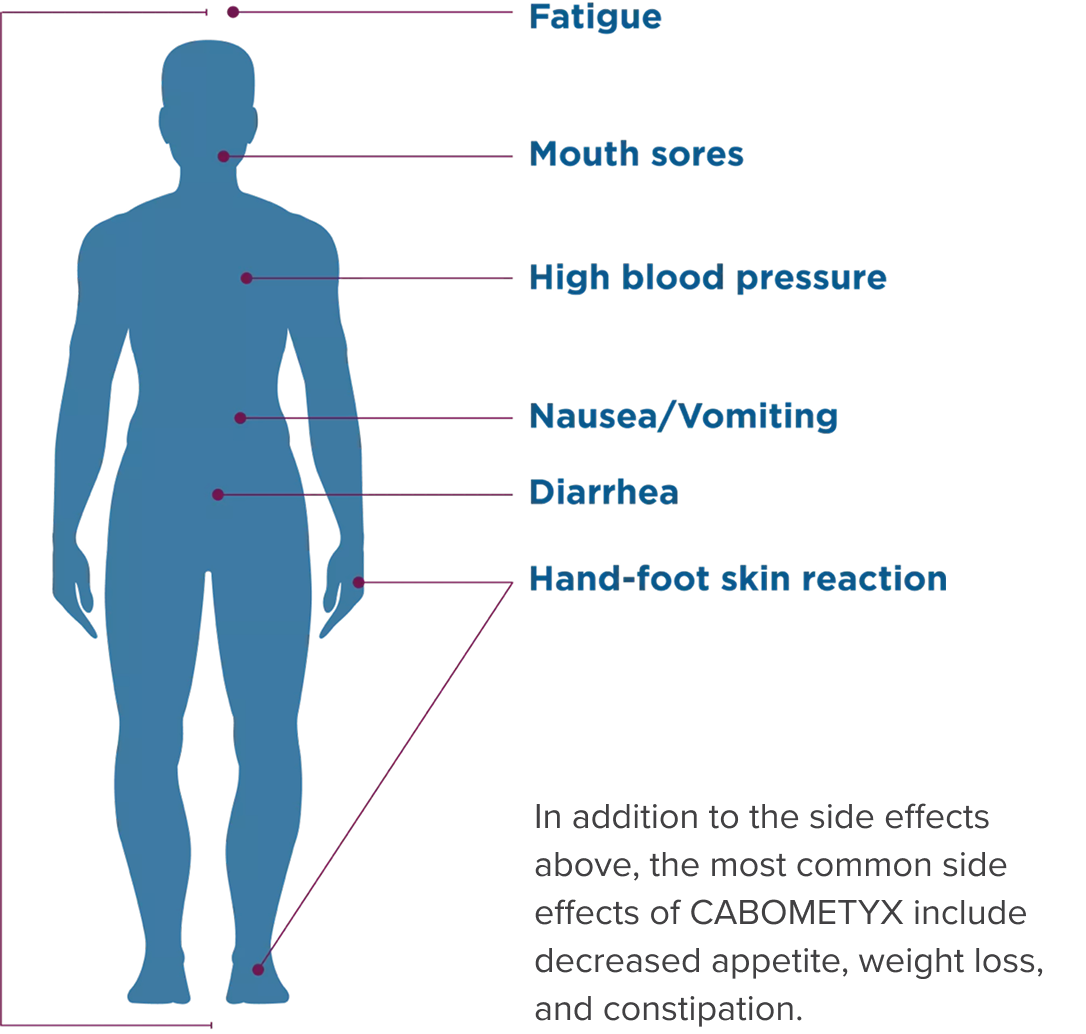
Tips to help manage certain side effects of CABOMETYX
These tips are not a substitute for medical advice by your healthcare team.
Please note not all side effects can be managed, and some may lead to permanent discontinuation of medicine.
These tips are based on information from a variety of organizations that provide information and support to people affected by cancer.
None of the products referenced in these tips are owned by Exelixis, Inc. or its affiliates. These tips are not endorsing those products and the manufacturers of those products have not endorsed these tips. Other similar products may be used.
Diarrhea, if it is not managed, can be very serious.
If you have any signs and symptoms and/or your stools are happening more often than normal, contact your healthcare team.

Remember AIM and call your healthcare team right away if you:
- Have any increase in bowel movements (4 to 6 additional episodes per day)
- Have blood around the anal area or in your stool
- Lose 5 or more pounds after the diarrhea starts
- Have pain in your belly or cramps that start and last for 2 or more days
- Don’t urinate for 12 or more hours
- Get a puffy or swollen belly
TIPS TO HELP WITH DIARRHEA
DO:
- Drink plenty of clear liquids
- Eat small, light meals many times a day (such as bananas, rice, applesauce, dry toast, or mashed potatoes)
- Keep track of how often you have diarrhea, the amount of fluid you drink, and your weight
AVOID:
- Caffeinated drinks (such as coffee and soft drinks) or dairy products (such as milk)
- Spicy, greasy, fatty, or high-fiber foods (such as fast food, raw vegetables, and nuts)

Loperamide (anti-diarrheal) tablets are included in the Patient Care Kit, which you may have received from your doctor or, if eligible,* you can order here.
Talk with your doctor about taking loperamide to make sure it’s safe for you.
- *
-
Terms and Conditions apply.

Certain medicines used to treat cancer may cause mouth problems such as:
- Canker sores
- Gum or mouth pain
- Infections in your mouth or gums
- Burning sensation of the tongue
- Red, swollen, or bleeding gums
- Change in how things taste

Remember AIM and call your healthcare team right away if you notice anything unusual.
- Check your mouth 2 times a day
- Look for small cuts, ulcers, sores, redness, swelling, or blood
TIPS for oral care
DO:
- Discuss plans for dental procedures with your healthcare team
- See your dentist regularly and tell them about the treatments you are taking
- Brush teeth regularly after each meal (use a soft toothbrush and children’s toothpaste)
- Floss your teeth at least once a day
- Keep your lips moisturized with a lip balm
- Rinse your mouth regularly with salt and baking soda mixture if you experience sores or dryness. Add 1 teaspoon of salt and 1 teaspoon of baking soda to 1 quart of warm water; stir or shake well. Sip the solution, swish it around and gently gargle, and then spit it out. Do not swallow
AVOID:
- Using mouthwash made with alcohol
If you experience mouth pain
DO:
- Suck on ice chips or ice pops
- Drink through a straw
- Talk to your oncology doctor about over-the-counter medicines that can be used for the pain
- Eat soft foods that can be swallowed easily
AVOID:
- Hard, crusty, salty, sticky, sugary, or spicy foods
- Fruits or juices that are acidic, such as tomatoes, oranges, grapefruits, limes, and lemons

You may feel nauseous (queasy) or vomit (throw up).

Remember AIM and call your healthcare team right away if you:
- Vomit more than 3 times an hour for more than 3 hours
- See blood in your vomit
- Your vomit looks like coffee grounds
- Cannot tolerate more than 4 cups of liquid or ice chips in a day
- Haven’t been able to eat for more than 2 days
- Are weak, dizzy, or confused
- Lose 2 or more pounds in 2 days
- Have dark-yellow urine
TIPS FOR MANAGING NAUSEA AND VOMITING
DO:
- Drink plenty of clear liquids (such as ginger ale, apple juice, or broth)
- Eat bland foods—with little to no taste (such as dry toast and crackers). Suck on lemon or mint candy to make a bad taste go away
- Raise the head of your bed for sleeping
AVOID:
- Heavy, fatty, greasy foods
- Strong odors
- Lying flat for at least 1 hour after eating
- Eating for 2 to 3 hours before you go to bed
For vomiting (throwing up what’s in your stomach)
DO:
- Keep track of how often you are vomiting, the amount of fluid you drink, and your weight
- After vomiting stops, slowly sip a small amount of cool liquid and suck on some ice chips or frozen juice chips
Your doctor may also prescribe a medicine for nausea and vomiting.

Queasy Drops®† are included in the Patient Care Kit, which you may have received from your doctor or, if eligible,‡ you can order here.
They have ingredients that may help stop nausea and dry mouth. Talk to your doctor before using.
- †
-
Queasy Drops is a registered trademark of Three Lollies, LLC.
- ‡
-
Terms and Conditions apply.
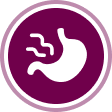
Fatigue, or feeling tired, weak, or lacking energy is a common side effect.

Remember AIM and call your healthcare team right away if you:
- Are too tired to get out of bed for 24 hours or more
- Can’t think clearly
- Can’t sleep at night
- Feel tired (out of breath or heavy/fast heartbeat) after doing small activities
TIPS FOR MANAGING fatigue
DO:
- Get a good night’s sleep each night (7 to 8 hours)
- Keep good sleep habits (go to bed at the same time each night and wake up at the same time each day)
- Sleep in a quiet and dark bedroom with a comfortable temperature
- Be as active as possible. It’s best to start slowly. Only do more when you are able to. Talk to your doctor for tips
- Plan ahead. Decide which activities are most important to you and schedule them throughout the day, if possible so you can take breaks
- Eat a nutritious and well-balanced diet (make sure you have enough calories and protein to give your body the energy it needs)
- Consider meeting with a registered dietitian who specializes in helping people with cancer
AVOID:
- Heavy meals before bedtime
- Caffeine close to bedtime. If you have caffeine, make sure it is 6 to 8 hours before going to bed. Caffeine can be in liquids (such as soft drinks and coffee), food (such as chocolate), and some medicines

HFSR is a side effect that causes symptoms such as pain and swelling in your hands or feet. This can be severe.
You may also hear your doctor call HFSR palmar-plantar erythrodysesthesia syndrome (PPES).

Remember AIM and call your healthcare team right away if you notice anything unusual such as:
- Your skin is red or swollen
- You feel tingling/burning or your skin is sensitive to touch
- You have thick calluses or blisters
- Your skin is cracked, flaking, or peeling
- Your skin has blisters, ulcers, or sores
- You have a hard time walking or using your hands (especially if it’s because of pain)

Start using the Udderly Smooth®§ Extra Care Cream included in the Patient Care Kit, which you may have received from your doctor or, if eligible,|| can order here.
Follow package directions or use as directed by your doctor.
Talk to your doctor about using drugstore creams such as clobetasol and halobetasol.
- §
-
Udderly Smooth is a registered trademark of Redex Industries, Inc.
- ||
-
Terms and Conditions apply.
TIPS FOR MANAGING HAND-FOOT SKIN REACTION (HFSR)
DO:
- Use an ice pack if your hands and feet feel hot (cool for 15 to 20 minutes)
- Take cool showers or baths
- Wear loose and comfortable clothing, well-fitting footwear, cotton gloves and socks to help protect your hands and feet
- Gently pat your skin dry after washing your hands or bathing
- Use mild, fragrance-free lotions
AVOID:
- Heat (hot water, hot showers and baths, direct sunlight, or other heat sources). Heat may make your symptoms worse or more likely to happen
- Pressure, friction, or rubbing
- Using hammers, shovels, knives, or other tools

It is important to take your blood pressure before you start taking your medicine and regularly during your treatment.
Keep a record of your blood pressure measurements so you can tell your doctor if there is a change. Hypertension can be severe.

Remember AIM and call your healthcare team right away if:
- Your blood pressure suddenly goes up
- Your blood pressure is outside the recommended range (normal blood pressure is 120/80). Talk to your doctor about your blood pressure goals
- You feel dizzy
- You have shortness of breath
- You have any new or worsening symptoms (eg, headaches, chest pains, visual changes)
TIPS FOR MANAGING HYPERTENSION (HIGH BLOOD PRESSURE)
DO:
- Talk to your doctor about how to take your blood pressure regularly
- Eat healthy (whole grains, fruits, vegetables, and low-fat dairy products such as yogurt)
- Exercise regularly
- Walking, jogging, cycling, or swimming are the best types of exercises that can help with blood pressure
- Talk to your doctor about what types of exercise he or she may recommend for you
AVOID:
- Too much salt, caffeine, or alcohol
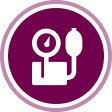
LEARN MORE ABOUT
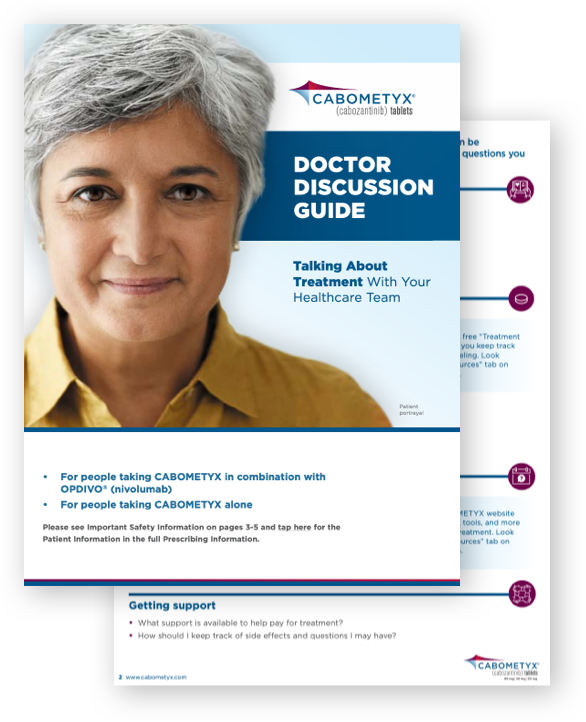
Talking to Your Doctor
Help make the most of your medical appointments by creating a Doctor Discussion Guide to talk about what’s important to you.

Liver Cancer Resources
There are many resources available for you or someone you are caring for to help throughout the treatment journey.
